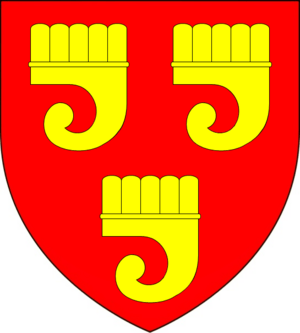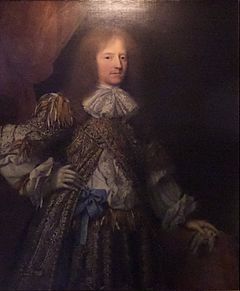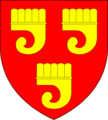Bevil Granville facts for kids
Quick facts for kids
Sir
Bevil Granville
|
|
|---|---|

Granville arms
|
|
| Governor of Barbados | |
| In office 1703–1706 |
|
| Monarch | Queen Anne |
| Governor of Pendennis Castle | |
| In office March 1696 – 1703 |
|
| Member of Parliament for Fowey |
|
| In office 1695–1698 |
|
| Member of Parliament for Lostwithiel |
|
| In office March 1690 – July 1695 |
|
| Personal details | |
| Born | 3 May 1665 (baptised) London |
| Died | 15 September 1706 (aged 41) At sea, returning from Barbados |
| Cause of death | Fever |
| Nationality | English |
| Relations | John Granville, 1st Earl of Bath (uncle); |
| Parents | Bernard Granville (1631–1701); Anne Morley; |
| Alma mater | Trinity College, Cambridge |
| Occupation | Soldier, politician and colonial administrator |
| Military service | |
| Allegiance | |
| Years of service | 1685 – 1703 |
| Rank | Brigadier General |
| Unit | Granville's Regiment of Foot |
| Battles/wars | Glorious Revolution Nine Years War Steenkerque; Siege of Namur |
Sir Bevil Granville (born 1665, died 1706) was an English soldier and politician. He came from Cornwall, a county in England. He was a MP, which means he was elected to help make laws for the country. He represented the areas of Fowey and Lostwithiel from 1690 to 1698.
Sir Bevil also held important military and government jobs. He was the Governor of Pendennis Castle from 1693 to 1703. Later, he became the Governor of Barbados, an island in the Caribbean, from 1703 to 1706. Sadly, he passed away at sea in September 1706 while returning to England.
Contents
Who Was Bevil Granville?
Bevil Granville was born in London and was baptised on May 3, 1665. He was the oldest son of Bernard Granville and Anne Morley. His grandfather, Sir Bevil Grenville, was a famous soldier who supported the King during the English Civil War. His father, Bernard Granville, also served the King and was an MP for many years.
Bevil had two younger brothers, George and Bernard. Bevil never got married. He left everything he owned to his brother George.
Bevil's Early Career

After finishing his studies at Trinity College, Cambridge in 1679, Bevil spent some years in Paris. When he came back to England in 1685, he joined the army. He became a captain in a regiment (a military unit) that his uncle, the Earl of Bath, had created. This was part of a plan by King James II to make the army bigger.
In 1686, King James made Bevil a knight. He was promoted to major in 1687. In 1688, his regiment was sent to protect Plymouth, an important port city. During the Glorious Revolution in November 1688, Bevil's uncle supported William of Orange, who became the new king. Bevil was sent to secure the island of Jersey.
A Soldier and Politician
In 1690, Bevil was elected as an MP for Lostwithiel. This area was under the control of his uncle, so it was easy for him to get elected. Even though he was an MP, he spent most of his time in the army. By this time, he was a lieutenant colonel.
His regiment was sent to Ostend in 1691 to fight in the Nine Years War. They faced many challenges and suffered heavy losses at the Battle of Steenkerque in 1692. In 1693, he became the colonel of the regiment. He returned to England in December, leaving another officer in charge of the fighting.
In 1695, he was elected MP for Fowey, another area controlled by his uncle. His regiment came back to England in 1696 because people were worried about an invasion. On March 21, he was made Governor of Pendennis Castle in Cornwall. This showed that he was trusted. The invasion didn't happen, and he and his regiment stayed in England until the war ended in 1697.
Governor of Barbados
Bevil was re-elected as an MP for Fowey in 1698. In 1701, he stepped down as an MP. When the War of the Spanish Succession started in July, his regiment went to fight in Flanders. However, Bevil did not go with them.
In May 1702, he was appointed Governor of Barbados. This was a very important job with a good salary. To take this role, he had to give up his position at Pendennis Castle and his army rank. It took a while to sort out these details, and he finally left for Barbados in March 1703. Before he left, he sold his regiment to another officer. He was also promoted to brigadier general. His brother George took over as Governor of Pendennis Castle.
Bevil arrived in Barbados in June 1703 with his youngest brother, Bernard. His time as governor was difficult. He often felt unwell and had disagreements with the local government in Barbados. Some settlers complained to the English Parliament about his leadership. Even though he was cleared of any wrongdoing in 1705, Bevil asked to be called back home. He died of a fever on September 15, 1706, while on the ship returning to England.
Images for kids
 | Jackie Robinson |
 | Jack Johnson |
 | Althea Gibson |
 | Arthur Ashe |
 | Muhammad Ali |


